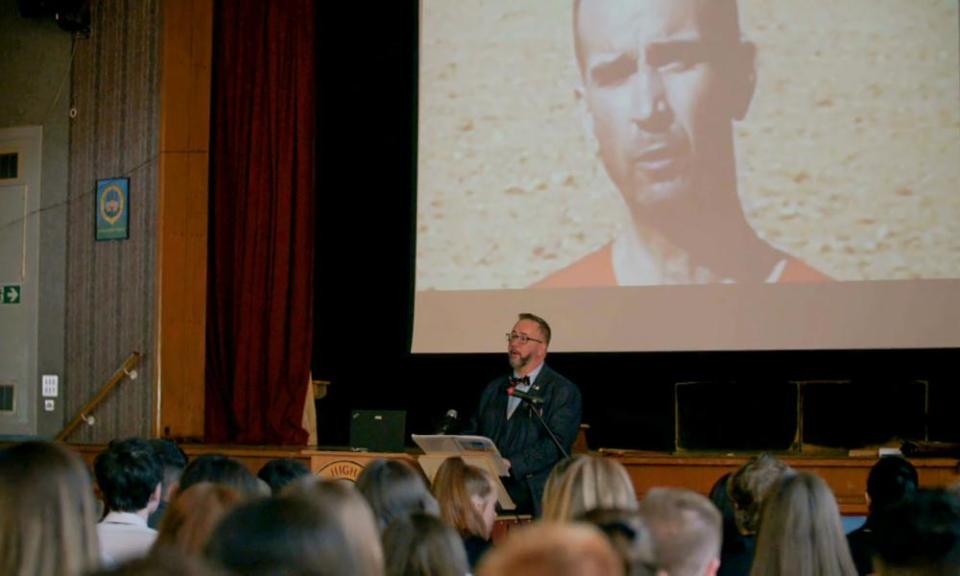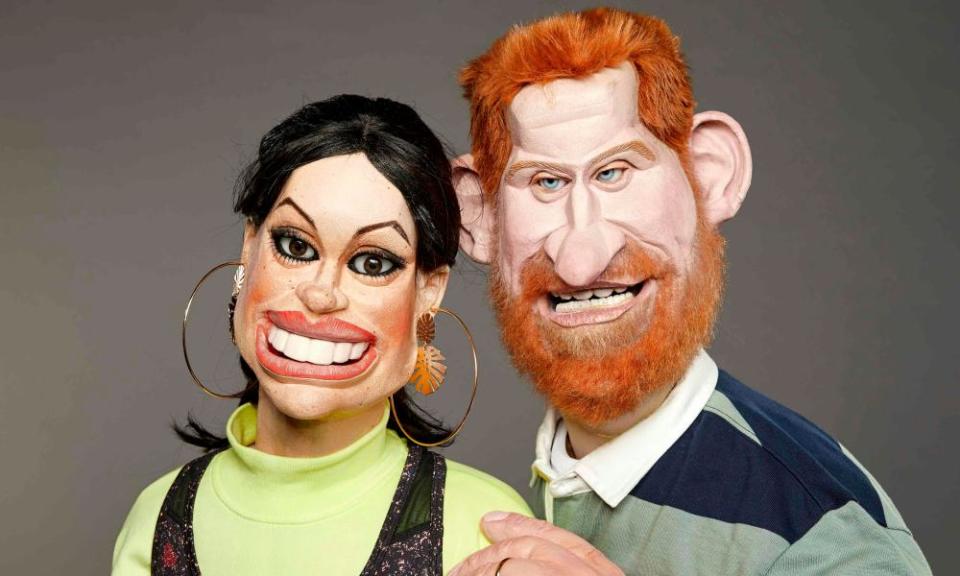The week in TV: In the Face of Terror; David Attenborough; Deaf U; Agatha and the Midnight Murders

In the Face of Terror (BBC Two) | iPlayer
Attenborough: A Life on Our Planet (Netflix)
Deaf U (Netflix)
Agatha and the Midnight Murders (Channel 5) | My5
Spitting Image (BritBox)
Two images of audiences held my attention this last week, more than any individual actor or slice of dazzling camerawork, and brought a tickly little piece of dust to the corner of my eye. The first time was in anger. That was on seeing Mike Haines, a bow-tied Dundonian gentleman whose beloved brother, the aid worker David, had been taken hostage by Isis and later beheaded: Mike was addressing a (pre-lockdown) school class of older teens and they were simply rapt, which I think you’ll agree is something of an achievement.
Rapt not with horror, or salacious shock: rapt mainly at Mike’s humanity. “I have a daily battle with hate,” he told them. “But if I hate, they win.” This was the searing first part (of three) of In the Face of Terror, telling the tales, via those left behind, of the hunt to expose “the Beatles”, the bleakly parodic moniker given to four unconscionably cruel executioners, including so-called “Jihadi John”, Mohammed Emwazi, the British Kuwaiti who personally decapitated seven UK and US hostages in Syria in 2014.
We saw Mike’s suffering, and that of Diane and John Foley, whose photojournalist son James was just one victim. We felt, through their tales and others, the savage frustration of hearing nothing from either Westminster, Washington or terrorists, for months on end; it was almost a relief when the Foleys received an emailed demand, no matter that it was for an impossible €100m. We imagined their hope, tinged surely with an accountable jealousy, at each news of a family in Holland or Norway or Australia getting their son or daughter back, Isis’s vitriol being mainly reserved for Britons and Americans.
Both nations famously refuse to negotiate with terror: that’s their prerogative, and we could argue till the camels come home. But the FBI certainly, with their infuriating blend of radio-silent unhelpfulness and sudden meddling interference, piled needlessly on to the Foleys’ woes: I’m not normally a fan of retrospective blame-gaming, but in this case there was (still is) a point to Diane’s anger. Barack Obama may be destined to sit at God’s right hand when you consider what came along afterwards, but his administration didn’t get everything right, by golly no they didn’t. A fascinating, lucid, painful series, which looks set to garner as much deserved kudos as the recent Once Upon a Time in Iraq.
The second image of an audience that really got me was in A Life on Our Planet, when David Attenborough was screening, to the kind of quangoed UN decision makers who should make important decisions, footage of walruses, bereft of snow and ice, dropping from cliffs like fat grey sacks to – there’s no gentle way to say this – explode on the rocks below. Hands flew to mouths in the auditorium, sobs spasmed in the dark. Minds may even have been changed, though not apparently enough to get their finger out. Attenborough’s suggested solutions – for there is much hope – were intriguing, nuanced and toweringly sane. Not just another beautiful, troubling watch, this Netflix film was rather more; indeed, may be the finest thing Attenborough has ever done.
Deaf U a groundbreaking new reality series, so far of only eight episodes, centres on Gallaudet University near Washington DC, an institution specifically for deaf people. It initially irked me, because the subjects are all rather whiny and overly prone to self-examination, but then it struck me: they’re just all young, and I am sadly not quite that any more.
As this travels along one gets intriguingly to grips with the complications a non-hearing life must involve. For example, so used are the hearing to soft, coupled murmurings, to pillow talk, we forget that a cuddling deaf couple have to split apart, on the grass or in the bed, to sign something to one another, be it profound or inane. And the snobbery – the “elite” fourth-gen deaf people, the bitter infighting between signers and lip-readers, all exacerbated by hormones and, now, social media. It’s going to grip, this series. And all students get exponentially more charming the longer this progresses, thanks be.
Channel 5 has managed, and rather well, to get a handful of dramas and documentaries severely right over the past couple of years. Anyone who tells you there’s “nothing on” needs to get a daily dose of Jeremy Vine on 5 in the morning, where ever-spiky guests fight the culture wars for us by proxy, headline by headline; and All Creatures Great and Small, which left us this week with the tantalising promise of a Christmas special, has been a thoroughgoing delight ever since the off. But Agatha and the Midnight Murders, seemingly out there to mark the 100th anniversary of Agatha Christie’s first novel, was not one of the channel’s successes. It was a mess: ill-plotted, playing bits for laughs or for horror without ever achieving either. One has to feel for poor Helen Baxendale, who tried gamely enough as Christie, but too often the blinked horror of having wandered into the entirely wrong show could be seen in her eyes. For all Christie’s faults, this was one dame who knew how to make a plot hang together, as I think more than 2bn global book sales rather illustrate: not even the worst iteration of a Poirot – Peter Ustinov, say – came near this woeful dreck.

The new Spitting Image will doubtless settle into tram-tracks of topicality, refettling itself and quietly dropping the characters that don’t work as weeks progress, but, so far its resurrection is pleasingly familiar to those who remember the original. Same hit-and-miss sketches, and they haven’t, despite early reports, held back on the viciousness. Some of the voices are a little strangely done – half of Scotland could do a better Michael Gove, and I don’t know what Harry’s accent is meant to be – and, frankly, The Windsors did a far better job of royal mockery. But, in general, a B-plus, which might itself be part of the problem: not quite sure how it hopes to convert entire new generations of tweet- and meme-savvy wits. Or even wants to. In which case, what is the point, other than nostalgia?

 Yahoo News
Yahoo News 